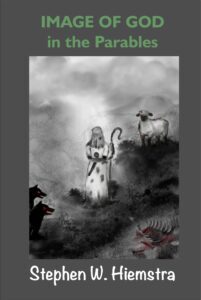Stephen W. Hiemstra's Blog, page 22
February 17, 2025
Availability: Monday Monologues (podcast), February 17, 2025

By Stephen W. Hiemstra
This morning I will share a prayer and reflect on Availability. After listening, please click here to take a brief listener survey (10 questions).
To listen, click on this link.
Hear the words; Walk the steps; Experience the joy!
Availability: Monday Monologues (podcast), February 17, 2025
Also see:
The Face of God in the Parables
The Who Question
Preface to a Life in Tension
Other ways to engage online:
Author site: http://www.StephenWHiemstra.net
Publisher site: http://www.T2Pneuma.com
Newsletter at: https://bit.ly/Market_2025, Signup
The post Availability: Monday Monologues (podcast), February 17, 2025 appeared first on T2Pneuma.net.
February 16, 2025
Prayer for Availability

By Stephen W. Hiemstra
Blessed Lord Jesus,
All praise and honor, power and dominion, truth and justice are yours because you are always available and answer our prayers.
We confess that we are not always fully present to those around us. Our minds wander and we wander through life without purpose or honor.
Thank you for the many blessings of this life, those that are obvious and those that we only discover as time passes.
In the power of your Holy Spirit, create in us a clean heart and a right spirit, that we might be fully present and share your presence with those around us.
In the name of the Father, the Son, and the Holy Spirit, Amen.
Prayer for Availability
Also see:
The Face of God in the Parables
The Who Question
Preface to a Life in Tension
Other ways to engage online:
Author site: http://www.StephenWHiemstra.net
Publisher site: http://www.T2Pneuma.com
Newsletter at: https://bit.ly/Market_2025, Signup
The post Prayer for Availability appeared first on T2Pneuma.net.
Oración de Disponibilidad

Por Stephen W. Hiemstra
Bendito Señor Jesús,
Toda alabanza y honor, poder y dominio, verdad y justicia son tuyos porque siempre estás disponible y escuchas nuestras oraciones.
Confesamos que no siempre estamos plenamente presentes para quienes nos rodean. Nuestras mentes vagan y vagamos por la vida sin propósito ni honor.
Gracias por las muchas bendiciones de esta vida, las que son obvias y las que solo descubrimos con el paso del tiempo.
En el poder de tu Espíritu Santo, crea en nosotros un corazón limpio y un espíritu recto para que podamos estar plenamente presentes y compartir tu presencia con quienes nos rodean.
En el nombre del Padre, del Hijo y del Espíritu Santo, Amén
Oración de Disponibilidad
Also see:
El Rostro de Dios en las Parábolas
Prefacio de La Guía Cristiana a la Espiritualidad
Prefacio de la Vida en Tensión
The Who Question
Other ways to engage online:
Author site: http://www.StephenWHiemstra.net
Publisher site: http://www.T2Pneuma.com
Newsletter at: https://bit.ly/Market_2025, Signup
The post Oración de Disponibilidad appeared first on T2Pneuma.net.
February 14, 2025
The Tax Collector and the Pharisee Revisited

In the beginning, God created the heavens and the earth.
(Gen 1:1)
By Stephen W. Hiemstra
Two words of theological importance in understanding God are transcendent and immanent. To say that God is transcendent means that he stands above or outside of the universe that he created. Normally we attribute transcendence to God the Father because of his role in creation. Just like a carpenter is not part of a cabinet that he builds, God stands outside the universe because he created it. By contrast, when we call Jesus Emmanuel, we are highlighting his immanence—God with us, as the word, Emmanuel, translates in Hebrew.
Have you ever wondered how God hears our prayers? If God the Father is transcendent and Jesus is immanent, just not standing in front of us, how does God know what we are praying? I have always seen this as a role of the Holy Spirit, God within us. The Holy Spirit is the power of God that sustains and provisions us, grants us spiritual gifts, and hears our prayers. As we read: “And the Spirit of God was hovering over the face of the waters.” (Gen 1:2) Hovering requires time and energy, just like your telephone requires electricity.
The Parable of the Pharisee and the Tax Collector
The Parable of the Pharisee and the Tax Collector, discussed earlier, pictures two worshippers in the temple praying. God the Father is normally considered the object of their prayer, but this parable includes an observer, Jesus Christ, who interprets the parable for us. It is Christ himself who cautions us: “For everyone who exalts himself will be humbled, but the one who humbles himself will be exalted.” (Luke 18:14)
The sort of humility in view in this parable is that of self-reflection. A self-reflective person is one who is open to learning from their own experience. I used to tell my kids that there are three kinds of people in this world: those who never learn, those who learn from their own mistakes, and those who learn from other people’s mistakes. While the parable appears to focus on this second type of learner, it is generally true that people who prayer are open to learning from God, which implies that Jesus does not discount the third type of learner.
More generally in this parable we witness God’s attribute of accessibility. God is accessible in prayer (through the Holy Spirit) and he is accessible through Jesus Christ by means of his parables. This accessibility is not constrained by the manner of prayer, but it is better to be humble than self-praising if you want to be justified. Here in this parable we see a God who stands as judge over both our actions and our prayers.
Justification before God
The Greek key term in this parable dikaio means: To take up a legal cause, show justice, do justice, take up a cause. (BDAG 2005). Justify is a legal term as used in Luke 18:14. The idea here is that a self-reflective, humble person is more likely to be right with God than someone full of themselves.
More normally as Americans, we eschew interpreting our relationship with God in strictly legal terms. Being a child of God suggests a more intimate relationship than we might seek in a court of law. But we are neither always obedient children nor always disobedience. Perhaps, a better way to look at it is to say we relate to God on multiple levels, depending on circumstances. The Good News is that regardless of circumstances, we are still members of God’s family.
The Tax Collector and the Pharisee Revisited
Also see:
The Face of God in the Parables
The Who Question
Preface to a Life in Tension
Other ways to engage online:
Author site: http://www.StephenWHiemstra.net
Publisher site: http://www.T2Pneuma.com
Newsletter at: https://bit.ly/Market_2025, Signup
The post The Tax Collector and the Pharisee Revisited appeared first on T2Pneuma.net.
El Fariseo y El Recaudador de Impuestos

En el principio Dios creó los cielos y la tierra.
(Gen 1:1)
Por Stephen W. Hiemstra
Dos palabras de importancia teológica para comprender a Dios son trascendentes e inmanentes. Decir que Dios es trascendente significa que está por encima o fuera del universo que creó. Normalmente atribuimos trascendencia a Dios Padre por su papel en la creación. Así como un carpintero no forma parte del gabinete que construye, Dios está fuera del universo porque él lo creó. Por el contrario, cuando llamamos a Jesús Emmanuel –Dios con nosotros, como significa su nombre en hebreo– estamos resaltando su inmanencia.
¿Alguna vez te has preguntado cómo escucha Dios nuestras oraciones? Si Dios Padre es trascendente y Jesús es inmanente, simplemente no está frente a nosotros, ¿cómo sabe Dios lo que estamos orando, especialmente cuando no pronunciamos las palabras? Siempre he visto esto como un papel del Espíritu Santo, Dios dentro de nosotros.
El Espíritu Santo es el poder de Dios que nos sostiene y provee, nos concede dones espirituales y escucha nuestras oraciones. Como leemos: ¨y el Espíritu de Dios se movía sobre la superficie de las aguas.¨ (Gen 1:2) Flotar requiere tiempo y energía, al igual que su teléfono requiere electricidad.
La Parábola del Fariseo y El Recaudador de Impuestos
La Parábola del Fariseo y El Recaudador de Impuestos, discutido anteriormente, muestra a dos fieles en el templo orando. Normalmente se considera a Dios Padre como el objeto de su oración, pero esta parábola incluye un observador, Jesucristo, que nos interpreta la parábola. Es el mismo Cristo quien nos advierte: ¨porque todo el que se engrandece será humillado, pero el que se humilla será engrandecido.¨ (Lucas 18:14)
El tipo de humildad a la que se refiere esta parábola es la de la autorreflexión. Una persona autorreflexiva es aquella que está abierta a aprender de su propia experiencia. Solía decirles a mis hijos que hay tres tipos de personas en este mundo: Las que nunca aprenden, las que aprenden de sus propios errores y las que aprenden de los errores de otras personas. Si bien la parábola parece centrarse en este segundo tipo de alumno, en general es cierto que las personas que oran están abiertas a aprender de Dios, lo que implica que Jesús no descarta el tercer tipo de alumno.
De manera más general, en esta parábola, somos testigos del atributo de accesibilidad de Dios. Dios es accesible en la oración (a través del Espíritu Santo) y es accesible a través de Jesucristo por medio de sus parábolas. Esta accesibilidad no está limitada por la forma de orar, pero es mejor ser humilde que alabarse a sí mismo si se quiere ser justificado. Aquí en esta parábola vemos a un Dios que actúa como juez tanto de nuestras acciones como de nuestras oraciones.
Justificación ante Dios
El término griego clave en esta parábola dikaio significa: “Emprender una causa legal, mostrar justicia, hacer justicia, emprender una causa.” (BDAG 2005). Justificar es un término legal como se usa en Lucas 18:14. La idea aquí es que una persona humilde y autorreflexiva tiene más probabilidades de estar bien con Dios que alguien lleno de sí mismo.
Más normalmente, evitamos una interpretación estrictamente legal de nuestra relación con Dios y preferimos ser llamados hijos de Dios, lo que sugiere una relación más íntima. Pero los niños pueden ser obedientes o desobedientes. Quizás una mejor manera de verlo es decir que nos relacionamos con Dios en múltiples niveles, dependiendo de las circunstancias. La buena noticia es que, independientemente de las circunstancias, seguimos siendo miembros de la familia de Dios.
El Fariseo y El Recaudador de Impuestos
Also see:
Prefacio de La Guía Cristiana a la Espiritualidad
Prefacio de la Vida en Tensión
The Who Question
Other ways to engage online:
Author site: http://www.StephenWHiemstra.net
Publisher site: http://www.T2Pneuma.com
Newsletter at: https://bit.ly/Market_2025, Signup
The post El Fariseo y El Recaudador de Impuestos appeared first on T2Pneuma.net.
February 11, 2025
Taitz Teaches Thoughtful Eating (part 1)
 Jennifer L. Taitz. 2012. End Emotional Eating. Oakland: New Harbinger Publications. (Goto part 2)
Jennifer L. Taitz. 2012. End Emotional Eating. Oakland: New Harbinger Publications. (Goto part 2)
Review by Stephen W. Hiemstra
In early January, Cub Run Recenter, where I swim, is busy each year with New Year’s resolutions athletes. New faces mostly disappear after two weeks and the regulars return to their usual routine. Raw, will power does not persist long.
IntroductionAddressing the limited resource—will-power—in her book, End Emotional Eating, Jennifer Taitz observes:
“Willpower, as it turns out, is less about will then it is about skill. Mischel [author of a study about the marshmallow test] explains that willpower relates to the ability to strategically direct attention. For example, teaching children [age 4] to pretend the marshmallow is just a picture transforms low delayers [kids unable to delay gratification] to high delays. Obsessing and focusing on the marshmallow creates intense temptation … In this book, you will learn to sit with temptation by paying attention in a particular way … you will practice living in full contact with the present moment, learning from your feelings, copying with distress skillfully, and developing self-compassion.” (1-2)
MindfulnessA key component in her Zen-influenced approach is developing mindfulness which she defines as: “present-focused, flexible, nonjudgmental awareness.” (3) She defines another key component of acceptance as:
“a willingness to experience thoughts and feelings, even uncomfortable ones. It doesn’t mean endorse things we don’t want to experience or running headlong into unpleasantness.” (3-4)
Taiz’s approach targets patients with eating disorders, like binging, bulimia, and anorexia. Still, the book reads equally well for people who struggle with maintaining a balanced, healthy relationship with food.
CaveatsSome of you may be like me and be suspicious of ideas, like mindfulness, which arise out of Eastern religions, like Zen Buddhism. It is good to be vigilant. In this context, I would make several observations.
God, as creator of heaven and earth, is also the origin of all knowledge, including knowledge of ourselves. In Proverbs, we read: “The lips of the wise spread knowledge; not so the hearts of fools.” (Prov 15:7 ESV) We should not fear knowledge, but focus on using it faithfully.Mindfulness is being aware of our thoughts, emotions, and responses, which is a skill that comes also with continuous prayer and meditation. Devout Christians routinely practice mindfulness.Mindfulness comes close to meditation as when a Zen author might encourage meditation on physical things, like a raisin. The Christian focus in mediation is more typically on Christ (as in the Jesus prayer) or on scripture (as in Lecto Divina). Recognizing that we worship the creator, not the creation, mediation on physical things may be helpful as spiritual exercise, but would not be otherwise encouraged.As Christians, it is our responsibility to understand the uses and abuses of knowledge, but especially spiritual knowledge. As such, Taitz’s work is helpful as a tool for dealing with the special problem posed by the sin of gluttony, sometimes referred to by its Latin name, gula, which has historically been called one of the seven deadly sins.
OrganizationDr. Jennifer L. Taitz is psychologist specializing in dialectical behavioral therapy (DBT) with degrees from New York University and Yeshiva University, also in New York. She writes in ten chapters, including:
Understanding Emotions and EatingAccepting the Idea of AcceptanceMindful MomentsEmotional IntelligenceSurfing Urges and Developing Realistic ConfidenceMinding Your MindCoping with Difficult Emotions with a Second HelpingCultivating Self-CompassionTasting ValuesEnding Well and Beginning Again.The book begins with acknowledgments, a foreword, and introduction; and ends with a list of references (iii-iv). Taitz offers detailed reviews of the literature and her references are helpful.
AssessmentJennifer L. Taitz’s book, End Emotional Eating, is accessible and interesting, and may be helpful in coping with a range of obsessive and addictive behaviors. Sprinkled throughout the chapters are helpful exercises to promote application of the concepts under discussion. I read the book to help me succeed in ramping down my weight and ramping up my exercise routine in the New Year and was pleased with what I learned—I suspect that you will be too.
In part 1 of this review, I have given an overview of Taitz’s work. In Part 2, I will look in more detail at some of her concepts and teaching.
ReferencesFairlie, Henry. 2006. The Seven Deadly Sins Today. Notre Dame: University of Notre Dame Press.
Kelly Koerner. 2012. Doing Dialectical Behavior Therapy: A Practical Guide. New York: Guilford Press. (Review: Koerner Explains DBT and Supporting Skills; http://wp.me/p3Xeut-1uP).
Footnoteshttp://www.FairfaxCounty.gov/parks/re....
The Apostle Paul writes: “pray without ceasing,” (1 Thess 5:17 ESV)
Fairlie (2006, 155-156) writes: “Avarice is more interested in possessing than in the possession, lust in sexual activity than in sexual feeling, and gluttony is more interested in eating than in the food. It is the appetites in themselves, and their need for gratification, that takes over one’s life.”
I first became aware of DBT because it is one of the few approaches that seemed to work with borderline personality disorder patients, who were previously thought to be untreatable. DBT practitioners are experts at emotional intelligence, another good reason to take a look. For a good review, see: (Koerner 2012).
Taitz Teaches Thoughtful Eating (part 1)Also see:Books, Films, and MinistryOther ways to engage online:Author site: http://www.StephenWHiemstra.netPublisher site: http://www.T2Pneuma.com Newsletter at: https://bit.ly/Janu_25, SignupThe post Taitz Teaches Thoughtful Eating (part 1) appeared first on T2Pneuma.net.
February 10, 2025
Judge: Monday Monologues (podcast), February 10, 2025

By Stephen W. Hiemstra
This morning I will share a prayer and reflect on The Callous Judge. After listening, please click here to take a brief listener survey (10 questions).
To listen, click on this link.
Hear the words; Walk the steps; Experience the joy!
Judge: Monday Monologues (podcast), February 10, 2025
Also see:
The Face of God in the Parables
The Who Question
Preface to a Life in Tension
Other ways to engage online:
Author site: http://www.StephenWHiemstra.net
Publisher site: http://www.T2Pneuma.com
Newsletter at: https://bit.ly/Janu_25, Signup
The post Judge: Monday Monologues (podcast), February 10, 2025 appeared first on T2Pneuma.net.
February 9, 2025
Petition for Ethical Guidance

By Stephen W. Hiemstra
Almighty Father,
All praise and honor, power and dominion, truth and justice are yours, because you teach us to the honor the law, be mindful of the world, and advise us when wisdom and knowledge fail us.
We confess that you alone are the Lord, nothing happens without your permission, but we are rude, impertinent, and are too quick to judge others. Forgive our hardened hearts and willful minds.
We give thanks that you are willing to overlook our shortcomings, teach us, and lead us where we need to go.
In the power of your Holy Spirit, quicken our consciouses that we might not sin. Remind us of your law, teach us about the ways of the world, and guide us even when we too easily stray.
In Jesus’s precious name, Amen.
Petition for Ethical Guidance
Also see:
The Face of God in the Parables
The Who Question
Preface to a Life in Tension
Other ways to engage online:
Author site: http://www.StephenWHiemstra.net
Publisher site: http://www.T2Pneuma.com
Newsletter at: https://bit.ly/Janu_25, Signup
The post Petition for Ethical Guidance appeared first on T2Pneuma.net.
Petición de Orientación Ética

Por Stephen W. Hiemstra
Padre Todopoderoso,
Toda alabanza y honor, poder y dominio, verdad y justicia son tuyos, porque tú nos enseñas a honrar la ley, a ser conscientes del mundo y a aconsejarnos cuando la sabiduría y el conocimiento nos fallan.
Confesamos que sólo tú eres el Señor. Nada sucede sin su permiso, pero somos groseros, impertinentes y demasiado rápidos para juzgar a los demás. Perdona nuestros corazones endurecidos y nuestras mentes obstinadas.
Te damos gracias porque estás dispuesto a pasar por alto nuestras deficiencias, enseñarnos y guiarnos a donde debemos ir.
En el poder de tu Espíritu Santo, aviva nuestra conciencia para que no pequemos. Recuérdanos tu ley, enséñanos acerca de los caminos del mundo y guíanos incluso cuando nos desviamos con demasiada facilidad.
En el precioso nombre de Jesús, Amén.
Petición de Orientación Ética
Also see:
El Rostro de Dios en las Parábolas
Prefacio de La Guía Cristiana a la Espiritualidad
Prefacio de la Vida en Tensión
The Who Question
Other ways to engage online:
Author site: http://www.StephenWHiemstra.net
Publisher site: http://www.T2Pneuma.com
Newsletter at: https://bit.ly/Janu_25, Signup
The post Petición de Orientación Ética appeared first on T2Pneuma.net.
February 7, 2025
The Callous Judge

Pilate said to him, What is truth?
(John 18:38)
By Stephen W. Hiemstra
Truth comes in many forms, some of which we prefer to ignore. The Book of Job articulates three ethical systems that are often in conflict:
One is good if one obeys the law (law).
One is smart when one understands how the world really works (wisdom).
One can only be justified through divine intervention (grace).
What then is truth? Pilate was smart enough to ask the question, but did not have the courage to act on what he knew.
The Parable of the Callous Judge
Sometimes leaders do the right thing for the wrong reason, as Jesus illustrates in the Parable of the Callous Judge:
And he told them a parable to the effect that they ought always to pray and not lose heart. He said, In a certain city there was a judge who neither feared God nor respected man. And there was a widow in that city who kept coming to him and saying, Give me justice against my adversary. For a while he refused, but afterward he said to himself, Though I neither fear God nor respect man, yet because this widow keeps bothering me, I will give her justice, so that she will not beat me down by her continual coming. And the Lord said, Hear what the unrighteous judge says. And will not God give justice to his elect, who cry to him day and night? Will he delay long over them? I tell you, he will give justice to them speedily. Nevertheless, when the Son of Man comes, will he find faith on earth? (Luke 18:1-8)
It is interesting that Jesus relates this story of conflicting motivations with faith. Too often we find ourselves struggling with multiple motivations and can be accused of even others. In the parable, the judge acts on behalf of the widow, not because it is the right thing to do under the law—although we assume it is—but because he wants to avoid her nagging. It is his own benefit, not hers, which prompts him to act.
The Ethical Dilemma
Motivations and even principles often come in tension with one another. Bonhoeffer (1976, 367) cites this example:
A teacher asks a child in front of the class whether it is true that his father often comes home drunk. It is true, but the child denies it. The teacher’s question has placed him in a situation for which he is not yet prepared. He feels only that what is taking place is an unjustified interference in the order of the family and that he must oppose it.
In Bonhoeffer’s example, the student is presented with an ethical dilemma and must choose between the Commandments to tell the truth (Exod 20:16) and to honor your parents (Exod 20:12). Which Commandment is more important and how do you decide?
More generally, the Ten Commandments provide theological principles outlining good and bad behavior. It is helpful to distinguish good and bad principles from right and wrong actions (Johnson and Zerbi 1973, 12). In Bonhoeffer’s example, it is good for the student to tell the truth and to honor parents, but it is wrong for the teacher to pose the question about the father’s drunken behavior (and embarrass the student publicly) and wrong for the student to verify it in public.
Principal Agent Problem
The Parable of the Callous Judge and the Bonhoeffer story are both examples of a principal agent problem, which arises when a leader makes organizational decisions based on personal benefits rather than organizational benefits. In the Bonhoeffer example, suppose that the teacher is a sadist who derives pleasure from tormenting students. By putting the student on the spot to verify the father’s drunkenness in public, the teacher derives sadistic pleasure at the risk of opening the school up to a potential lawsuit from the student’s family. In doing so, the teacher’s interests and the school interests deviate demonstrating a principal agent problem, a special kind of ethical dilemma facing leaders.
Sexual harassment, pedophilia, taking bribes, and narcissistic leadership are all potential manifestations of the principal agent problem. In the postmodern context, a distinguishing characteristic of an amoral organization is that leadership prosecutes principal agent problems while generally eschewing the moral failings of members and leaders.
In a world of conflicting motivation and incomplete information, law and worldly wisdom are insufficient. The intervention of the Holy Spirit remains our only option. In the Parable of the Callous Judge we meet a God who desires to be part of our daily lives.
The Callous Judge
Also see:
The Face of God in the Parables
The Who Question
Preface to a Life in Tension
Other ways to engage online:
Author site: http://www.StephenWHiemstra.net
Publisher site: http://www.T2Pneuma.com
Newsletter at: https://bit.ly/Janu_25, Signup
The post The Callous Judge appeared first on T2Pneuma.net.



